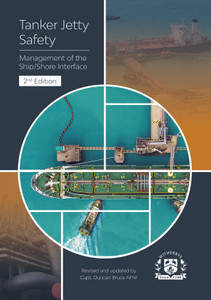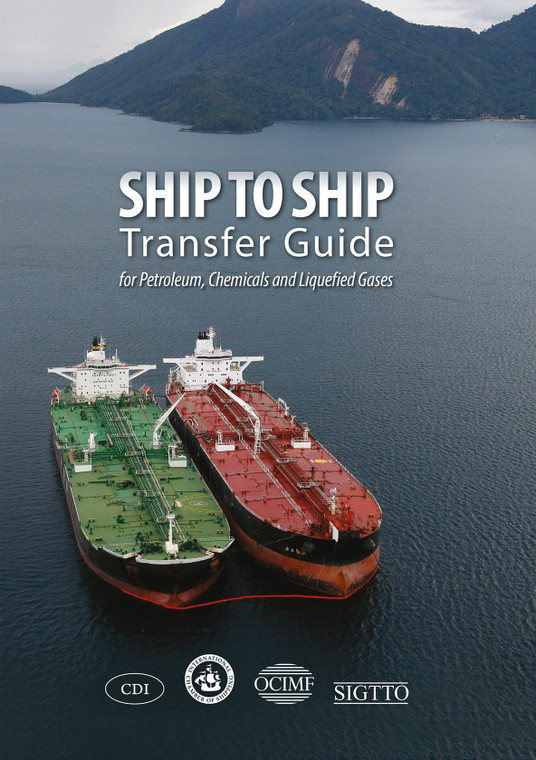
Ship to Ship Transfer Guide for Petroleum, Chemicals and Liquefied Gases
This cross industry publication developed jointly by ICS, OCIMF, SIGTTO and CDI provides guidance on planning and execution of STS operations. It is applicable to all ships involved in transfer activities and to all types of bulk liquid cargoes, whether transferred at sea or in port. It will benefit Masters, Marine Superintendents and others, such as STS service providers and transfer organisers, involved in STS operations.
This industry guide provides recommendations on safety, minimum equipment levels and good operating practices for STS operations. It is a required publication on the SIRE Vessel Inspection Questionnaires (VIQ) for Oil Tankers, Combination Carriers, Shuttle Tankers, Chemical Tankers and Gas Tankers.
This book supersedes:
- Ship to Ship Transfer Guide (Petroleum) 4th Edition published in 2005
- Ship to Ship Transfer Guide (Liquefied Gas) 2nd Edition published in 1995
- LNG Ship to Ship Transfer Guidelines published in 201.1
This book builds on the previous recommendations and recognises experience gained in the industry of STS transfer operations, including transferring chemical (MARPOL Annex II) and liquefied natural gas (LNG) cargoes. The guide is applicable to transfers involving all bulk liquid cargoes, but where specific recommendations relate to a particular cargo type these can be found in the appendices. For transfers involving Annex I cargoes, the guide supports the requirements and recommendations developed by the International Maritime Organization (IMO).
The purpose of this document is to provide guidance to Masters and operators of vessels undertaking side-by-side ship to ship (STS) transfer operations of crude oil, petroleum products, chemicals and liquefied gases, both at sea and in port. Other parties may also benefit from studying these guidelines. Such parties may include ship charterers, traders, STS service providers and those contracting STS service providers.
The structure of this Guide has been developed such that all general references to STS operations that are applicable irrespective of the cargo being transferred are included in the main section of the document, Recommendations that relate to a particular cargo are included in separate appendices for crude oil and petroleum products, chemicals, liquefied petroleum gas (LPG) and liquefied natural gas (LNG).
The advice contained in this Guide may be supplemented by instructions from individual ship operators in order that particular aspects of their own procedures can be covered.
The requirements of MARPOL Annex 1 chapter 8. The Prevention of Pollution During Transfer of Oil Cargo Between Oil Tankers at Sea (reference 35), should be adhered to for all applicable operations involving oil cargoes. The requirement for vessels to be provided with an STS operations plan should be considered for adoption by vessels involved in the STS transfer of other cargoes as recommended best practice. For further guidance on the content of STS operations plans, reference should be made to appendix A.
Section 1 – General Principles
1.1 Introduction
1.2 Background
1.3 Scope
1.4 Risk assessments
1.5 Control of operations
1.6 Role of a ship to ship superintendent
1.7 Person in overall advisory control
1.8 Training and familiarisation of ship’s personnel
1.9 Security
Section 2 – Conditions and Requirements
2.1 Ship to ship compatibility
2.2 Notification to and approval from authorities
2.3 Transfer area
2.4 Environmental conditions
2.5 Quality assurance of ship to ship service providers
Section 3 – Safety
3.1 General
3.2 Risk assessment
3.3 Personal protective equipment and life saving appliances
3.4 Use of checklists
3.5 Material safety data sheets
3.6 Gas accumulation on open decks
3.7 Action in case of infringement of safety
3.8 Action in case of cargo leakage
3.9 Helicopter operations
3.10 Safety during cargo transfer
Section 4 – Communications
4.1 General communications
4.2 Language
4.3 Pre-arrival communications
4.4 Navigational warnings
4.5 Communications during approach, mooring and unmooring
4.6 Communications during cargo transfer operations
4.7 Procedures for communication failure
Section 5 – Operational Preparations
5.1 General
5.2 Joint plan of operation
5.3 Preparation of ships
5.4 Lightering support vessels
5.5 Navigational signals
Section 6 – Manoeuvring and Mooring
6.1 Basic principles
6.2 Manoeuvring alongside at sea with two ships under power
6.3 Manoeuvres with one ship at anchor
6.4 Manoeuvring for in port operations
6.5 Manoeuvring with one ship alongside a terminal
6.6 Mooring operations
Section 7 – Procedures Alongside
7.1 Pre-transfer procedures
7.2 Responsibility for cargo operations
7.3 Planning for cargo transfer
7.4 Cargo transfer – general guidance
7.5 Operations after completion of cargo transfer
7.6 Bunkering and storing
Section 8 – Unmooring
8.1 Preparations for unmooring
8.2 Unmooring procedure
Section 9 – Equipment
9.1 Fenders
9.2 Cargo transfer hoses
9.3 Mooring equipment
9.4 Personnel transfers – at sea operations
9.5 Personnel transfers – in port operations
9.6 Lighting
9.7 Ancillary equipment for ship to ship operations
9.8 Equipment noise levels
Section 10 – Emergencies
10.1 Contingency planning and emergency response procedures
10.2 Emergency signal
10.3 Emergency situations
10.4 Examples of potential emergencies
10.5 Shipboard Oil Pollution Emergency Plan, Shipboard Marine Pollution Emergency Plan (SMPEP) and Vessel Response Plan (VRP)
10.6 State of readiness for an emergency
10.7 Cessation of transfer operations as a precautionary measure
Appendices
A Additional considerations for ship to ship transfers involving MARPOL Annex I cargoes (crude oil and petroleum products)
B Additional considerations for ship to ship transfers Involving MARPOL Annex II Cargoes (chemicals)
C Additional considerations for ship to ship transfers involving liquefied petroleum gas cargoes
D Additional considerations for ship to ship transfers involving liquefied natural gas cargoes
E Operational/safety checklists
F Example checklist for personnel transfers by crane
G Example checklist for transfers involving vapour balancing
H Fender selection calculation
I Considerations applicable to reverse lightering operations
J Guidance for connection of individual hose lengths to assemble a hose string
K Guidance on risk assessment processes
L Example liquefied natural gas ship to ship transfer compatibility questionnaire
OCIMF
The Oil Companies International Marine Forum (OCIMF) is a voluntary association of oil companies with an interest in the shipment and terminalling of crude oil, oil products, petrochemicals and gas. OCIMF focuses exclusively on preventing harm to people and the environment by promoting best practice in the design, construction and operation of tankers, barges and offshore vessels and their interfaces with terminals.Learn more: https://www.ocimf.org/#about
ICS
The International Chamber of Shipping (ICS) is the principal international trade association for the shipping industry, representing shipowners and operators in all sectors and trades.
ICS membership comprises national shipowners’ associations in Asia, Europe and the Americas whose member shipping companies operate over 80% of the world's merchant tonnage.
Established in 1921, ICS is concerned with all technical, legal, employment affairs and policy issues that may affect international shipping.
ICS represents shipowners with the various intergovernmental regulatory bodies that impact on shipping, including the International Maritime Organization.
ICS also develops best practices and guidance, including a wide range of publications and free resources that are used by ship operators globally.
https://www.ics-shipping.org/about-ics/about-ics
SIGTTO
The Society of International Gas Tanker and Terminal Operators (SIGTTO) is an international body established for the exchange of technical information and experience, between members of the industry, to enhance the safety and operational reliability of gas tankers and terminals.
https://www.sigtto.org/about-us/
CDI
The CDI is a chemical industry organisation, incorporated under the law of the Netherlands as the Stichting Chemical Distribution Institute (CDI) and operates as a non-profit making foundation.
CDI is managed by a Board of Directors consisting of seven individuals nominated by the participating chemical companies. The Board of Directors establishes policy and is responsible for overall affairs of the foundation. Individual Executive Boards are elected to oversee and direct the staff managing day to day activities for the Marine, Terminals and Marine Packed Cargo Schemes.
- Number of Pages:
- 160
- ISBN:
- 9781856095945
- Binding Format:
- Hardback
- Book Height:
- 240 mm
- Book Width:
- 150 mm
- Weight:
- 1.2 kg
- Published Date:
- November 2013
- Publication Date:
- November 2013




